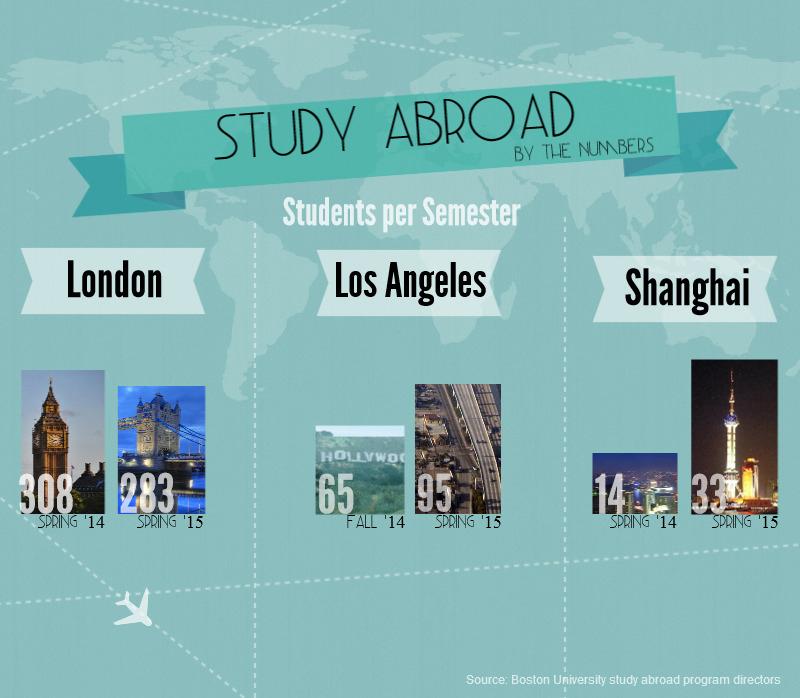With Boston University expanding its English-speaking study abroad options, several directors of the abroad programs are seeing a record-high number of students traveling abroad for studies and internships.
BU programs in Shanghai, Madrid, Los Angeles and Paris have seen a growing number of students choosing these locations to study abroad, the programs’ directors each said.
Bill Linsman, director of the Los Angeles Internship Program, said there are 95 students participating in the program during the spring 2015 semester, compared to the 60 who participated in fall 2014 and the 45 who participated during summer 2014.
“Our primary mission is to provide an educational experience. The success we’ve had in alumni gaining employment has been tremendously influential, but is a consequence of that activity,” he said. “We are now entering our 11th year, and every year it has grown because students tell other students that it works. The proof of the pudding is that 72 percent of the students who have been through the program are employed in entertainment, media or advertising today.”
Adding specific tracks in film and television, public relations, advertising and business have attributed to the growing number of students interested in the Los Angeles program, Linsman said.
Amalia Pérez-Juez, director of the BU Madrid program, said she is expecting the program’s largest group this spring with 96 students.
“Thirty years ago, we only had Spanish majors, but there are no Spanish majors anymore,” she said. “We are seeing a number of Spanish minors or double majors, so we are seeing students primarily from IR [international relations], political science [and] biology who want to come to Spain and practice their Spanish.”
Offering science and engineering tracks have also helped increase the number of students interested in studying in Madrid, Pérez-Juez said.
“Over the years, we have grown into a different program, and now we offer something that has helped us grow in the past and that has been the science and engineering programs,” she said. “Those programs are not the typical ones because they are not taught in Spanish. Although we are in Spain and the students live with host families and learn their Spanish, all those classes are taught in English.”
Renée Pontbriand, director of the BU Paris program, said the average number of participants for spring and fall programs ranges from 40 to 50 students.
“Professionalizing the academics and intellectualizing the professional is our mantra,” she said in an email. “Putting into practice in the workplace what you learn in the classroom is the ultimate goal of our program, while also allowing students to self-reflect. Many students are preoccupied with how they will be able to pay off their loans, so getting job experience is very important.”
Allison Rottmann, director of the BU Shanghai program, said this spring semester has 33 students, the largest group since the program began in 2009.
“I really hope it’s the start of something new, and that our new numbers for the next few years will stay between 25 and 35,” she said. “That would make me very happy because I do feel that at a university the size of Boston University and with China being as important as it is on the world stage, that there should be 40 or 50 students each semester that want to study in China. I’m very, very glad to see that the program is experiencing slow but steady and continual growth.”
Rottmann said she and the staff in Shanghai are well-equipped to deal with the increase of interested students in the coming years.
“We do think we are going to face some challenges this semester, but we feel perfectly capable of coping with them,” she said. “This semester, I’ve capped my class at 15 because I do want it to be more of a small seminar style than to turn it into a larger lecture. But who knows? … We have, over the last couple of years, been slowly and steadily preparing for this increase, so I actually think we are in very good shape, and it won’t require too much adjustment on our part.”
Several students said they are happy to see that more people are interested in studying abroad, but feel that there are further improvements the various programs can make.
Keri McAlpine, a senior in the College of Communication, who interned while studying abroad in London, said she would like to see the program improve how it pairs students with internship opportunities.
“A lot of people that I knew while I was abroad had a bunch of complaints about the internship program and how it was run,” she said. “For mine, I went on my interview for my internship and I didn’t think I wanted it, but [the company] pushed me into it. It seemed like they didn’t want to go through the trouble of finding something that I would like more, so I ended up staying with the internship.
Cherie Gu, a senior in CAS who studied in Paris, said while the softened language requirements have allowed more people, including herself, to participate in the program, she can see why taking immersive language courses can be more fulfilling.
“Because they changed the language requirement, it means that people who don’t speak French very well can go to Paris,” she said. “If you take all your classes in English while you are living in Paris, it defeats the purpose of trying to learn French at the same time.”
Amal Hechehouche, a junior in CAS who studied abroad in Morocco, said working and studying in another country can be challenging, but the experience helps students grow.
“I was working for an NGO [non-government organization] in Morocco called L’Espace Associatif that focuses on enhancing the relationships between different civil societies within Morocco,” she said. “It’s a really interesting and unique organization … It was definitely a challenge, but it was a really meaningful part of my abroad experience.”
























































































































